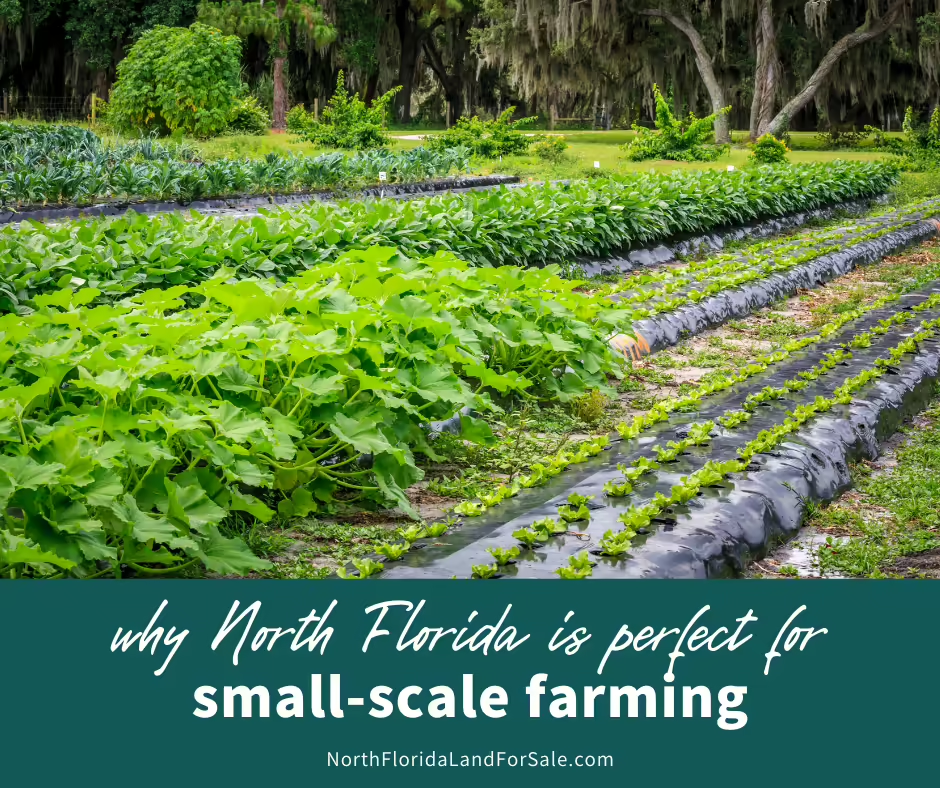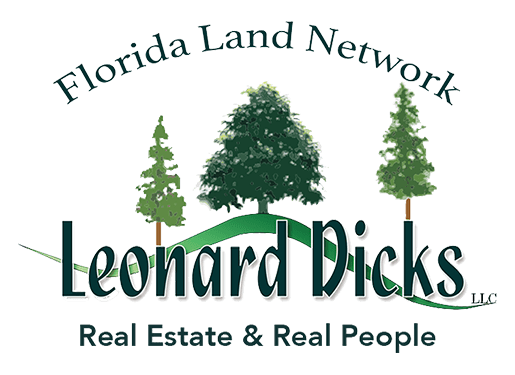
North Florida offers the ideal setting for small-scale farming, with a combination of favorable climate, rich soils, and resources to support sustainable agriculture. Whether you’re new to farming or looking to expand, North Florida provides numerous advantages for those interested in creating a productive and profitable farm.
Favorable Climate for Diverse Crops and Livestock
North Florida’s mild climate, with warm summers and short, temperate winters, makes it possible to grow a wide variety of crops year-round. With an extended growing season lasting about ten months, the region supports the cultivation of fruits, vegetables, grains, and specialty crops. Additionally, winters are mild enough that livestock can graze throughout the year with minimal shelter needs, which reduces the costs associated with seasonal feed or shelter for animals.
For small-scale farmers, this climate flexibility enables continuous production, reducing the need for extensive storage or seasonally limited sales. The University of Florida’s Institute of Food and Agricultural Sciences (UF/IFAS) provides region-specific planting guides and crop recommendations to help farmers make the most of North Florida’s climate. These guides cover crop schedules, pest management, and even soil amendments tailored to North Florida’s growing conditions, making it easier to plan and manage productive agricultural cycles.
Fertile Soils that Boost Crop Yield
North Florida’s soils are particularly conducive to small-scale agriculture. Loamy and sandy soils are common in the region, with loamy soils providing an excellent balance of drainage and nutrient retention, while sandy soils are well-suited for root vegetables and other crops that prefer well-drained soil. With proper management, both types of soil can be highly productive and relatively low maintenance.
For new farmers, accessing soil information is essential to understanding how best to use the land. The Natural Resources Conservation Service (NRCS) offers free soil surveys and soil conservation resources to help farmers determine the most suitable crops and soil management practices. Through the NRCS, farmers can assess nutrient levels, pH, and water retention properties of their soil, allowing them to select crops that thrive naturally in North Florida’s environment and make informed decisions on soil amendments if needed.
The NRCS also supports sustainable practices like cover cropping and crop rotation to maintain soil fertility, which can benefit small-scale farmers by improving productivity and reducing reliance on costly fertilizers.
Access to Water Resources and Irrigation Options
Water access is a crucial factor for any farm, and North Florida is rich in natural water sources, including rivers, lakes, and underground aquifers. Many rural properties in North Florida have access to well water, which can be used for irrigation. If you need to install a well, the Florida Department of Environmental Protection (DEP) provides guidelines and permitting resources for private well construction, ensuring that water sources are used responsibly and sustainably.
For irrigation, drip and micro-spray systems are popular in North Florida because they efficiently deliver water to plants while minimizing waste. Additionally, rainwater harvesting systems can provide an eco-friendly way to supplement irrigation, taking advantage of North Florida’s high annual rainfall. Setting up efficient irrigation reduces reliance on external water sources, which is essential for sustainable farming and helps keep operational costs low.
Supportive Agricultural Community
One of the most valuable aspects of farming in North Florida is the supportive agricultural community, which includes local networks, farmers’ markets, co-ops, and resource-sharing groups. Farmers can connect with organizations like the Florida Farm Bureau Federation, which offers networking opportunities, cooperative buying options, and lobbying support for agricultural policies. Engaging with local farming communities can help new farmers find mentorship, collaborate on projects, or learn best practices from seasoned farmers.
For those interested in selling produce directly to consumers, the presence of farmers’ markets and community-supported agriculture (CSA) programs offers additional income opportunities. Selling locally keeps transportation costs low, improves access to fresh produce for the community, and strengthens relationships between farmers and customers.
Extensive Educational Resources for Sustainable Farming
North Florida is home to extensive educational resources designed to support small-scale farmers in building sustainable and productive operations. The UF/IFAS Extension offers a range of workshops, testing services, and field demonstrations covering areas such as organic farming, livestock management, and crop-specific best practices. These resources are particularly helpful for new farmers who need guidance on topics like soil health, pest control, and efficient land management.
Soil testing, provided through UF/IFAS, allows farmers to assess nutrient levels and soil pH, which is essential for deciding on the best crops and understanding when and how to fertilize. The UF/IFAS Extension also offers pest management strategies, emphasizing integrated pest management (IPM) to minimize the use of harmful pesticides. By using IPM techniques, farmers can protect their crops without adversely affecting local ecosystems, which is essential for maintaining a sustainable operation.
Flexibility in Zoning and Permitting
Zoning laws in many North Florida counties are supportive of small-scale and diversified farming operations. Land with agricultural or rural zoning typically permits a range of farming activities, from crop production to animal husbandry. North Florida’s counties are generally more flexible in zoning than urban areas, allowing farmers to use their land for multiple purposes, such as adding a small homestead, selling produce on-site, or creating agritourism experiences.
To ensure your intended activities align with local regulations, consult the local zoning office or the Florida Department of Economic Opportunity (DEO), which provides information on land use and zoning requirements. Working within agricultural zones can also make you eligible for property tax benefits and agricultural exemptions, reducing the overall cost of ownership.
Government Programs Supporting Small-Scale Farmers
The Florida Department of Agriculture and Consumer Services (FDACS) and other government agencies offer grants, low-interest loans, and incentives for small-scale farmers. Programs focused on sustainable practices, water conservation, and farm improvements can help reduce the financial burden of starting a farm. Additionally, the USDA’s Farm Service Agency (FSA) provides microloans and grants to support new and small-scale farmers in North Florida, offering funding to purchase equipment, seed, and other farm essentials.
Accessing these programs allows small farmers to build their operations without taking on significant debt, making farming financially feasible and sustainable in the long term.
Are You Buying a Home or Land for Sale in Lake City?
If you’re moving to Lake City, we can help you find the perfect place to live. Call us at 386-243-0124 to tell us what you want from your home and we will begin searching right away.
Check these out:
- Paved road frontage for sale in Columbia County
- Non-deed-restricted land for sale in Columbia County
- Wooded oak tree land for sale in Columbia County
- Land-for-land home combo in Lake City
- Waterfront residential in Lake City
- Waterfront land in Columbia County
- Bank-owned homes and foreclosure in Columbia County
- Short sales in Columbia County






